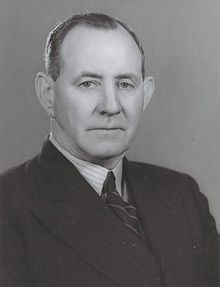Harold Thorby
|
The Honourable Harold Thorby |
|
|---|---|
 |
|
| Member of the Australian Parliament for Calare |
|
|
In office 19 December 1931 – 21 September 1940 |
|
| Preceded by | George Gibbons |
| Succeeded by | John Breen |
| Personal details | |
| Born |
2 October 1888 Annandale, Sydney |
| Died | 1 January 1973 (aged 84) Wahroonga, Sydney |
| Nationality | Australian |
| Political party | Australian Country Party |
| Spouse(s) | (1) Vera Lynda Morley (2) Alfreda Rogers Smith |
| Children | Two daughters |
| Occupation | Grazier |
Harold Victor Campbell Thorby (2 October 1888 – 1 January 1973) was an Australian politician and government minister.
Thorby was born in the Sydney suburb of Annandale and was educated at Geurie Public School and Sydney Grammar School and worked on his grandparents' farm at Geurie. He studied woolclassing, veterinary science and architecture and became a grazier. In 1916, he married Vera Lynda Morley and they had two daughters.
Thorby was a member of the three-member electoral district of Wammerawa in the NSW Legislative Assembly from 1922 to 1927 for Country Party. After its division into single-member electorates in 1927 he represented Castlereagh for one term to 1930 until his defeat by Joseph Alfred Clark of the Australian Labor Party. He was the Minister for Agriculture and chairman of the Water Conservation and Irrigation Commission in the government of Thomas Bavin from 1927 to 1930, during which construction of the Wyangala Dam commenced, the Burrinjuck Dam was finished and the Hawkesbury Agricultural College was enlarged.
At the 1931 general election, Thorby won the federal seat of Calare, which he until 1940. He was a Minister without Portfolio from November 1934 to November 1937 in the Lyons government, entitled Assistant Minister for Repatriation (1934–35), Minister for War Service Homes (1935–36) and Assistant Minister for Commerce (1935–37). In the Lyons and Page Ministry governments, he was Minister for Defence from November 1937 to November 1938 and Minister for Works and Minister for Civil Aviation from November 1938. During this period he initiated a program of adding annexes to existing factories to accelerate armaments production, but this program failed to spend even budgeted funds. In April 1939, he left the ministry when the Country Party refused to take part in the Menzies government. With the formation of a coalition government in March 1940, Thorby became Minister for Health and Postmaster-General.
...
Wikipedia
